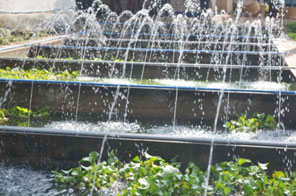
-
Date: 30th January 2017 to 9th February 2017
Venue: ICAR-CIFE, Panch Marg, Off. Yari Road, Versova, Andheri (west), Mumbai 400 061.
View Map
How to reach
Mumbai is well connected from all major cities of India by road, rail and air. The Institute is located about 8 km away from the domestic and international airports and 20 km from Dadar railway terminus. The weather is pleasant during February with temperature ranging from 18¬24ºC. The trainees are advised to carry light warm clothing.Eligibility:
Scientists, Assistant Professors or equivalent and above working in ICAR Institutes, SAUs, CAUs, SVUs and KVKs are eligible to participate in the training program. The participants must have a master's degree in Aquaculture/ Fish and Fisheries/ Veterinary sciences/ Life sciences and related disciplines. The applications must be forwarded by the Head of Institution. All the applications duly forwarded should be sent to the Coordinator, 'Application of Molecular Markers in Fish Breeding', ICAR-Central Institute of Fisheries Education, Panch Marg, Off Yari Road, Versova, Mumbai-400 061 on or before 5th January 2017.Selection of participants
The total number of participants will be 25. A list of candidates will be prepared as per the criteria developed for the course and will be displayed in the ICAR-CIFE website and intimation will be sent to the selected participants by 10th January 2017Prelude to the CAFT program
The main goal of fish breeding programs is to increase profitability and sustainability of production. In aquaculture, the current genetic improvement programs focus on selecting superior broodstock and using better breeding practices. These programs have already led to more efficient, productive and profitable aquaculture systems. However, our understanding of genetics, which is the biological basis of heredity and variation among organisms, has deepened dramatically in the last several decades. This new knowledge promises to speed and amplify genetic advances in the near future. Molecular markers and tools for statistical analysis have revolutionized the analytical power necessary to explore genetic diversity. The application of molecular markers to address questions related to aquaculture and fisheries management has been steadily increasing in the last three decades.These markers provide various scientific observations which have importance in aquaculture practices such as,
- Species Identification
- Genetic Variation and Population Structure analysis in Natural Populations
- Comparison between Wild and Hatchery Populations
- Assessment of Demographic Bottlenecks in Natural Populations
- Monitoring of Inbreeding or other Changes in the Genetic Composition of Stocks,
- Parentage Analysis and
- Identification of Markers associated with Quantitative Trait Loci and use of these markers in selection programs.
The main objective of this program is to impart hands-on training on development of molecular markers and their application in fish breeding with an ultimate goal to develop core personnel in the field of selective breeding of fish. Since new generation sequencing (NGS) plays a major role in identifying SNPs that are markers of choice for trait association studies, the present program includes a 3 day module on NGS data analysis right from quality check to assembly, annotation, genome-wide SNP and SSR mining, transcriptome, gene regulatory network, pathway analysis, transcription factor and micro RNA prediction and metagenomics. This module will be conducted by Dr. Dinesh Kumar and team from IASRI, New Delhi.
Contents
Development and applications of molecular markers- Mitochondrial
- Microsatellite
- SNP
NGS data analysis- SNP and SSR mining, transcriptome, gene regulatory network, pathway analysis, transcription factor and micro RNA prediction and metagenomics
Travel, boarding and lodging
The participants are allowed to travel by their entitled class (not above II AC train fare) or by state bus. Actual TA will be reimbursed on production of a certificate and tickets by the participants. Free boarding and lodging will be provided only to the participants within the budgetary provisions as per ICAR norms. No accompanying persons will be allowed.Last date for receipt of nomination
5th January 2017Intimation of selection
10th January 2017Last date for receipt of confirmation
15th January 2017Address for communication:
Dr. Gopal Krishna, Director, CIFE, Versova, Mumbai - 400061. Email: director@cife.edu.in; aparnac@cife.edu.inFor more information, click Download

